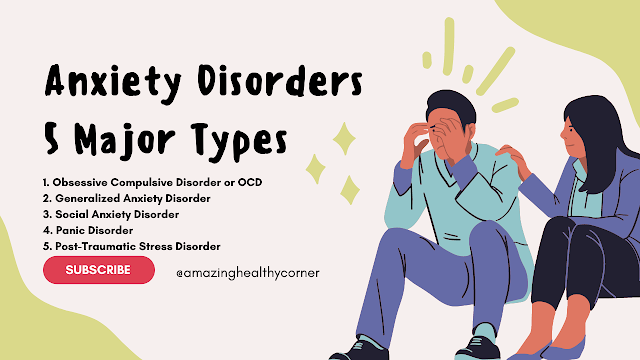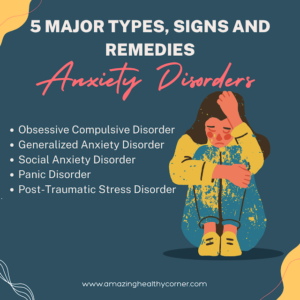Anxiety Disorders: The Five Main Types and Their Effects
There is not just “one form” of anxiety disorder. Every type of anxiety has its own set of signs, causes and remedies. While certain symptoms will overlap, it is crucial to keep this in mind. Each anxiety illness is unique. The five main anxiety disorders and their effects on sufferers are highlighted in this list.
Here are five types of anxiety disorders, along with their signs and remedies:
Obsessive Compulsive Disorder: How to Cope with Anxiety and Compulsions
1. Obsessive Compulsive Disorder or OCD: The obsessions and the compulsions are the two parts of obsessive compulsive disorder. Obsessions can range from a profound dread of germs to obsessing over the arrangement of objects in the house, and many other things in between. The patient uses their compulsions to get rid of intrusive thoughts. Someone who has a fixation with germs would wash their hands ritualistically or always carry hand sanitizer. Someone who is preoccupied with object placement may rearrange their possessions numerous times until it seems exactly perfect. The sufferer’s daily life might be severely interrupted and invaded by these obsessions and compulsions. There are a few OCD therapies, including: There are drugs that selectively block the reuptake of serotonin, like fluoxetine and sertraline. These drugs are intended to assist the patient’s symptoms subside, making them more tolerable and less harmful. Psychotherapy is another treatment that is frequently employed. To help the patient essentially rewire their response to obsessions and compulsions, cognitive behavioural therapy may be employed in this situation. The majority of the time, drugs and therapies are combined for the best outcomes.
Generalized Anxiety Disorder: The Mysterious Disease That Won’t Go Away
2. Generalized Anxiety Disorder: Compared to the other anxiety disorders on this list, generalised anxiety disorder (GED) is a little different. Patients with GED occasionally struggle to explain their symptoms. In fact, a general sense of ease or restlessness is one of the symptoms. Worry could also be one of the symptoms for them. Everybody worries occasionally, but those who have GED tend to eternalize their fears and elevate them to a whole new level. They might have obsessive thoughts about them, which would set off a chain reaction of other symptoms, like irregular sleep. Treatment options for GED are comparable to those for OCD. Treatment and medication. But rather than the usual SSRIs, in this scenario the drugs might be benzodiazepines and antidepressants. Along with relaxation methods and mindfulness training, cognitive behavioural therapy is used with GED students.
Anxiety Disorder: When Social Situations Trigger Panic
3. Social Anxiety Disorder: Social settings would trigger panic episodes in those with social anxiety disorder. They may experience stage fright or a fear of public speaking as a result, which might be so severe that they avoid being in public at all. The symptoms of social anxiety might also include extreme self-consciousness and a generalised fear of social situations. Even if they aren’t speaking to the group as a whole, a person with social anxiety may find it difficult to talk while other people are around. SSRIs and therapy are the major treatments for social anxiety. Just while a therapy choice appears comparable for one anxiety to another, it won’t necessarily be the same, as we previously indicated. Every patient has specific needs that must be considered. Not every therapy will be effective for every patient. Treatment individualization is crucial in these circumstances.
1 in 4 adults suffer from anxiety disorder – don’t be one of them!
4. Panic Disorder: Panic disorder depends only on panic attacks, unlike the other anxiety illnesses on this list. Panic episodes are but one sign of panic disorder, which shares symptoms with many other anxiety disorders. The symptom is those attacks. Recurrent panic attacks are a sign of panic disorder. Heart palpitations may be experienced by the patient, obliterating feelings of extreme anxiety and helplessness. Many of these attacks have no rhyme or reason, so the victim essentially waits in anticipation for the next one to occur. There are numerous techniques to treat panic disorder. We’ve all heard of some of the drugs that are used, like benzodiazepines and SSRIs. We also learn about beta blockers and serotonin norepinephrine reuptake inhibitors, or SNRIs. Similar to OCD, these drugs are frequently combined with therapy to increase the effectiveness of each.
PTSD: Anyone can have anxiety disorders, not just veterans or police officers
5. Post-Traumatic Stress Disorder: Anyone can be diagnosed with post-traumatic stress disorder (also known as PTSD). You’ve probably heard it most often when people talk about veterans or police officers. Even though PTSD is more common in particular professions, anyone can be given the diagnosis. A very stressful event or series of events is what causes PTSD. This causes flashbacks and night terrors in which the victim feels as though they are again at the original scene of the incident. Additionally, the patient may experience panic episodes and phobias related to individuals, places, or even sounds. There are medications that can be used to treat PTSD, including fluoxetine and venlafaxine. Additionally, therapies such brief eclectic psychotherapy, cognitive processing therapy, and prolonged exposure may be used. Once more, in this case, combining medication and treatment can assist provide a greater result than either one used alone. It’s crucial to remember that people with PTSD have a tendency to act out in specific circumstances. However, there is no reason to be fearful of the victims. Nothing about them is inherently hazardous. In actuality, those with mental illnesses are far more likely to be the victims of violent crimes than to commit them.
Anxiety Disorders: The Most Commonly Diagnosed and Discussed
By no means is this a full list of the various anxiety disorders that exist, nor is each description entirely thorough. There are many different types of anxiety; these are simply the ones that are now the most discussed and diagnosed. Regardless of which anxiety illness a person has been diagnosed with, it is critical to keep in mind that they require support and acceptance. You don’t need to have any knowledge of anxiety to be able to provide someone a listening ear or some words to keep them in the present. Remind the patient that they are fine, that their symptoms are only signs of their anxiousness, and that, given time, their symptoms will go away. Apart from that, just wait it out and make sure they know you are there with them.



